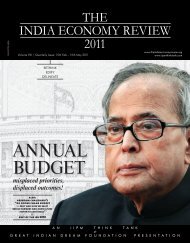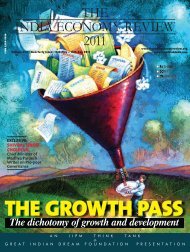Download - The India Economy Review
Download - The India Economy Review
Download - The India Economy Review
You also want an ePaper? Increase the reach of your titles
YUMPU automatically turns print PDFs into web optimized ePapers that Google loves.
tion and higher growth requires rapid<br />
reform of markets. At the same time ac-<br />
tion on poverty would require attention to<br />
market failure and merit goods. For both<br />
tasks we require radically new vision and<br />
models, not modifi cation of existing formulas.<br />
We need visionary thinking and<br />
smart solutions not just expedient ones.<br />
If we agree on this agenda, we need to<br />
settle the question of agency – to whom to<br />
assign the jobs. We have two alternatives.<br />
<strong>The</strong> fi rst is to distribute the jobs among<br />
central ministries and pass those involving<br />
state subjects to state governments.<br />
<strong>The</strong> second alternative is to employ a<br />
single pan-<strong>India</strong>n organisation with adequate<br />
reserve of talent and expertise. I<br />
favour the latter and suggest the Planning<br />
Commission. <strong>The</strong> Planning Commission<br />
is preferable to the decentralised approach<br />
for both reforming the markets as<br />
also organising non-market production.<br />
To deal with the constraints on market<br />
operations, we require an organisation<br />
that has the full view of the economy and<br />
a system-wide vision and expertise. It is<br />
because of this that the Planning Commission<br />
has an edge. If called upon to<br />
strengthen markets in their jurisdictions,<br />
individual ministries will end up duplicating<br />
efforts in several places and yet leave<br />
gaps in the overall mechanism. Different<br />
rules for separate jurisdictions will leave<br />
loopholes that would undermine and corrupt<br />
the system. Planning Commission<br />
can avoid the waste of duplication and<br />
produce system-wide mechanisms that<br />
avert loopholes. Secondly, the Planning<br />
Commission can pool its expertise to bear<br />
on all the dimensions of a given issue–<br />
economic, legal, political, technical and<br />
so on. To develop a comparable amount<br />
of talent and intellect pool at all important<br />
ministries is simply wasteful.<br />
In case of non-market production, too,<br />
the decentralised approach has serious<br />
drawbacks. Generally more than one<br />
T RANSFORMATIVE PLANNING<br />
It can avoid the waste of duplication<br />
and produce system-wide<br />
mechanisms that avert loopholes<br />
ministry has interest and jurisdiction over<br />
any given social issue. <strong>The</strong>ir approaches<br />
and priorities are generally different and<br />
any given issue will result in a number of<br />
different responses from different ministries.<br />
<strong>The</strong> responses often lead to turf<br />
wars, delay and lack of transparency about<br />
who is responsible. On the other side, the<br />
fact that the problems fall under different<br />
jurisdictions means that we require an<br />
organisation that can see all aspects from<br />
a systemic and non-jurisdictional view<br />
point and have expertise in all the dimensions<br />
of the problems. Clearly the job suits<br />
an organisation like the Planning Commission<br />
better.<br />
I should however point out that the<br />
Planning Commission would require<br />
some change in its mindset to spearhead<br />
the transition. <strong>The</strong> organisation was an<br />
instrument for centralised economic decisions,<br />
a culture that politicises economic<br />
decisions. This has politicised the Commission<br />
in the past. Its enviable core of<br />
technical and economic expertise has<br />
rarely been allowed to solve problems for<br />
the country on its own. <strong>The</strong>y have been<br />
led and constrained by political people<br />
rather than experts. To make a transition,<br />
the government should realise that a liberal<br />
market economy has much less need<br />
of political personalities in its economic<br />
establishments, and enable the Commission<br />
to give its best by handing its leadership<br />
to experts.<br />
(<strong>The</strong> views expressed in the write-up are<br />
personal and do not reflect the offi cial<br />
policy or position of the organization.)<br />
THE INDIA ECONOMY REVIEW<br />
57





